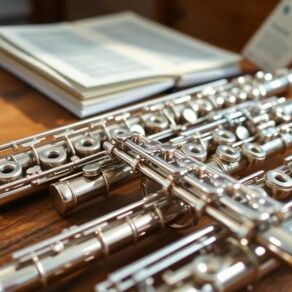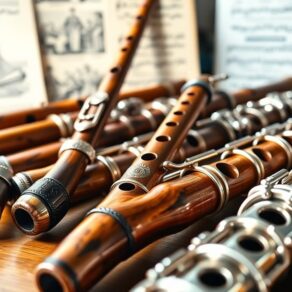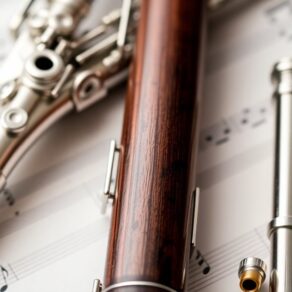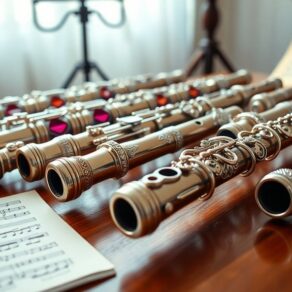Choosing the right flute material and type can enhance your musical experience. Wooden flutes provide rich, warm tones and dynamic range, ideal for expressive playing. Metal flutes, typically made of silver, offer bright projection and durability, perfect for ensemble settings. If you're starting out, plastic flutes are an affordable option with decent quality and vibrant designs. Composite flutes combine the best of wood and metal, delivering a warm sound with less maintenance. Specialty flutes cater to specific styles, enriching your musical repertoire. Each type has its own unique benefits that impact your playing journey considerably. Explore these nuances further for deeper insights.
Key Takeaways
- Wooden flutes offer rich, warm tones, enhancing expressive playing and connecting musicians to traditional craftsmanship through unique tonal characteristics.
- Metal flutes provide bright, focused sound and durability, making them ideal for ensemble performances due to their excellent sound projection.
- Plastic flutes are affordable and durable, producing a clear tone, making them a practical choice for beginners and young players.
- Composite flutes combine durability and sound quality, resembling wooden flutes while being more affordable and less sensitive to environmental changes.
- Specialty flutes cater to specific musical styles, enhancing cultural expression and adding unique tonal qualities suitable for various performance contexts.
Wooden Flutes
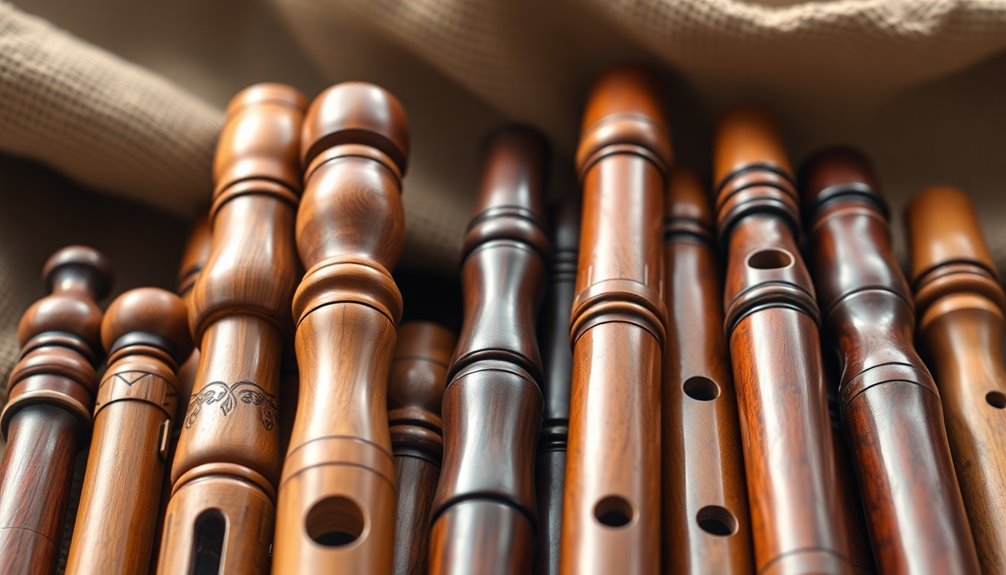
Wooden flutes have long been celebrated for their rich, warm tones and unique tonal characteristics. Their appeal lies not only in the sound they produce but also in the traditional craftsmanship that goes into each instrument. When you pick up a wooden flute, you're engaging with a piece of art shaped by skilled hands and a deep understanding of acoustics.
The tonal characteristics of wooden flutes set them apart from other materials. The wood itself contributes to a fuller, more resonant sound, allowing for a wide dynamic range and expressive playing. This is particularly important for musicians who seek to convey emotion and nuance through their performances.
The choice of wood—whether it's bamboo, grenadilla, or rosewood—affects the flute's timbre and overall sound quality. Each type of wood brings its own voice, influencing how the instrument responds to your breath and technique.
Additionally, the craftsmanship involved in creating a wooden flute often incorporates time-honored methods that enhance the instrument's playability and sound production. Artisans pay close attention to the bore shape, hole placement, and finishing techniques, ensuring that each flute not only looks beautiful but also performs exceptionally well.
Interestingly, bamboo flutes are also noted for their unique sound quality, making them a popular choice for both beginners and professionals alike.
As you explore the world of wooden flutes, you'll find that their unique blend of rich tones and traditional craftsmanship fosters a sense of connection, both to the instrument and to the community of musicians who cherish them.
Embrace this journey, and you might discover a deeper appreciation for the art of flute playing.
Metal Flutes
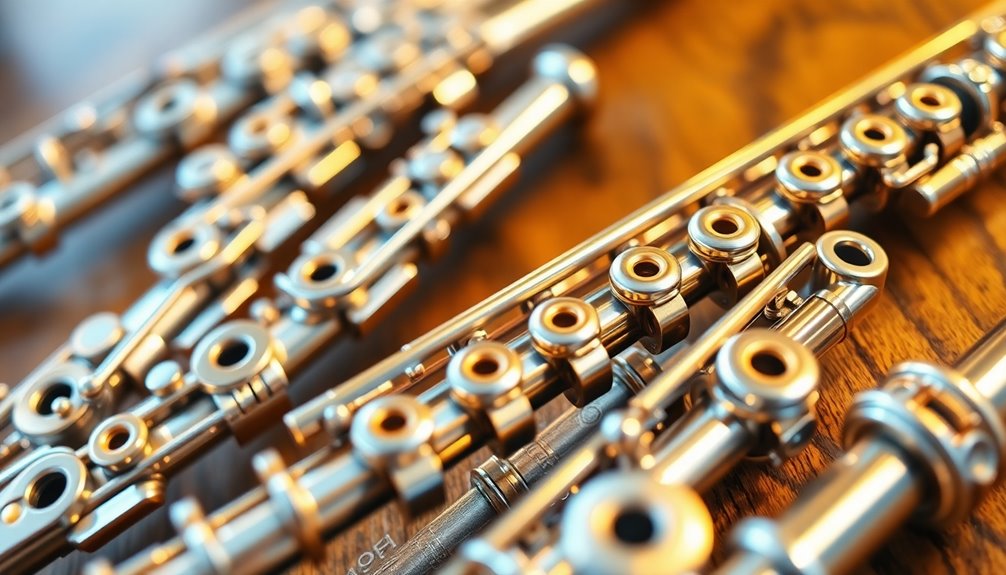
When considering metal flutes, you'll find they stand out for their bright, focused sound and durability. Metal flutes, particularly silver flutes, are a popular choice among both beginners and experienced players. Their construction typically involves either silver or a combination of metals, which contributes to their robust tonal quality and resonance.
For beginners, metal flutes offer a reliable entry point into the world of flute playing. They're often more affordable than their professional counterparts while still providing excellent sound quality. Many entry-level silver flutes are designed with a closed hole mechanism, making it easier for new players to produce clear notes without the intricate fingerings that open hole flutes require. This can help you build confidence as you develop your skills.
One significant advantage of metal flutes is their longevity. Unlike wooden flutes, which can be sensitive to temperature and humidity changes, metal flutes maintain their integrity over time, making them a practical choice for daily use. This durability allows you to focus on your practice without worrying about potential maintenance issues. Additionally, their shatterproof designs enhance safety, especially for those playing in various environments.
Furthermore, metal flutes tend to project sound well, making them suitable for ensemble playing or performances. Whether you're playing in a concert band or a small group, you'll appreciate the clarity and projection that these flutes offer.
Plastic Flutes
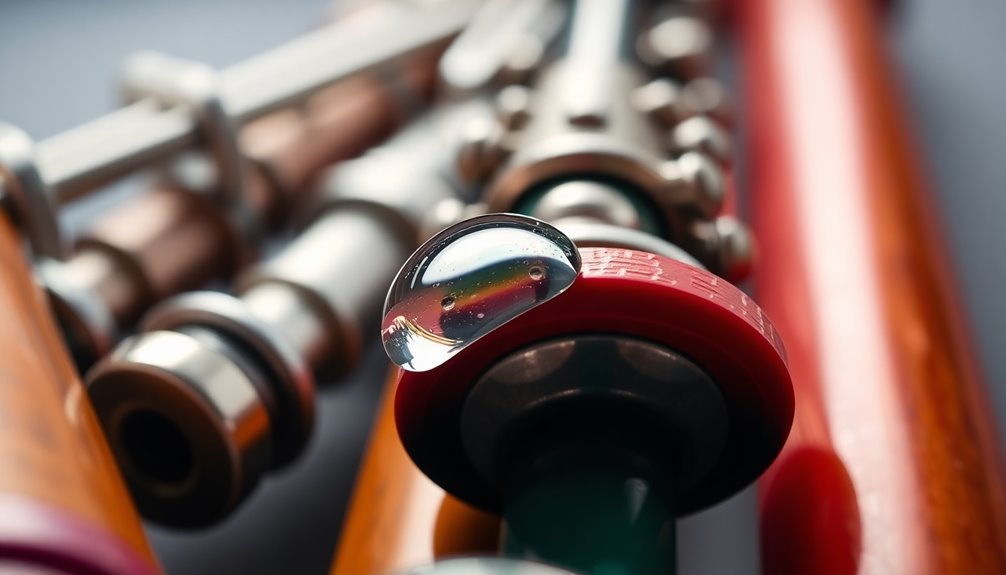
Plastic flutes offer a practical alternative for beginners or casual players seeking an affordable instrument with decent sound quality. These flutes are made from durable materials that withstand the rigors of frequent use, making them ideal for students or those who may not handle their instruments with care. The durability factors of plastic flutes considerably reduce the risk of damage, ensuring that you can focus on learning and playing without the worry of costly repairs.
In terms of sound quality, plastic flutes may not match the richness of metal or wooden flutes, but they still produce a clear, pleasant tone that can be quite satisfying, especially for those just starting. Many manufacturers have invested in technology to enhance the acoustics of plastic models, allowing them to deliver a surprisingly robust sound. This balance of affordability and reasonable sound quality makes plastic flutes an appealing choice for school programs, community bands, and casual jam sessions.
Moreover, plastic flutes often come in a variety of colors and designs, which can foster a sense of individuality and belonging among players. This aesthetic appeal can be particularly engaging for younger musicians, encouraging them to express themselves creatively while learning music. Additionally, the educational value of plastic flutes introduces kids to music in a playful manner, enhancing their auditory skills and cognitive abilities.
Composite Flutes
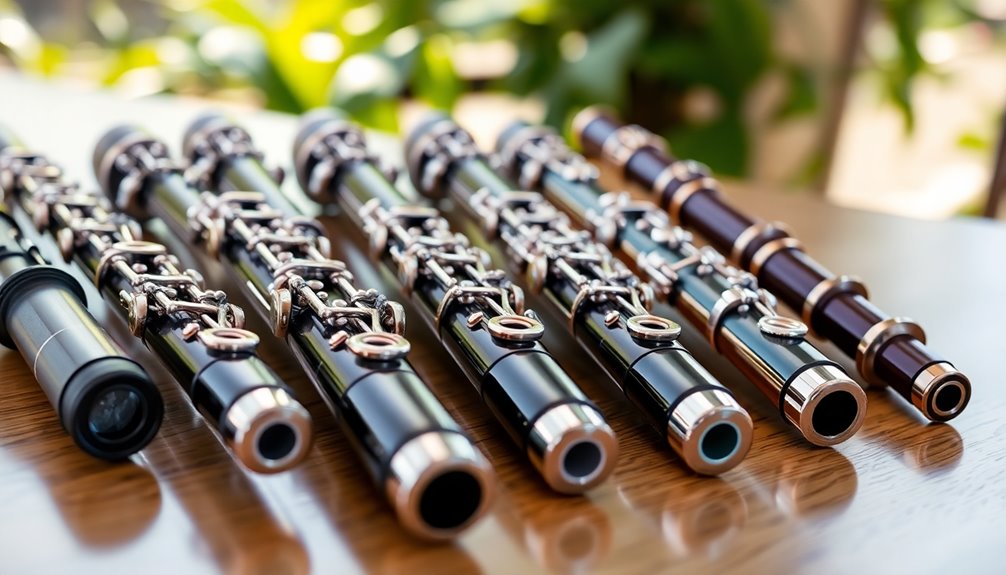
Composite flutes combine advanced materials to create an instrument that balances durability, sound quality, and affordability. These flutes often feature a blend of wood, metals, and synthetic materials, allowing for a unique construction that can outperform traditional wooden or metal flutes in certain aspects.
When considering durability comparison, composite flutes typically withstand temperature changes and humidity better than their wooden counterparts, making them a reliable choice for musicians who perform in varied environments.
The sound quality of composite flutes is often praised for its richness and warmth, closely resembling that of wooden flutes. This is particularly beneficial for beginners and intermediate players who want an instrument that can produce a pleasing tone without the high maintenance associated with wood.
The advanced materials used in composite flutes help maintain consistent performance, ensuring you can focus on your playing rather than worrying about your instrument's condition. Additionally, many composite flutes feature closed-hole keys, which support finger placement and technique development for early learners.
Moreover, composite flutes are generally more affordable than solid wood or high-end metal flutes, making them an attractive option for students or those on a budget. They offer a fantastic entry point into the world of flute playing, providing a balance of quality and resilience that builds confidence as you develop your skills.
To summarize, if you're looking for a versatile instrument that delivers both durability and impressive sound quality, composite flutes are worth considering. They can help you feel more connected to the music you create while ensuring your instrument stands the test of time.
Specialty Flutes
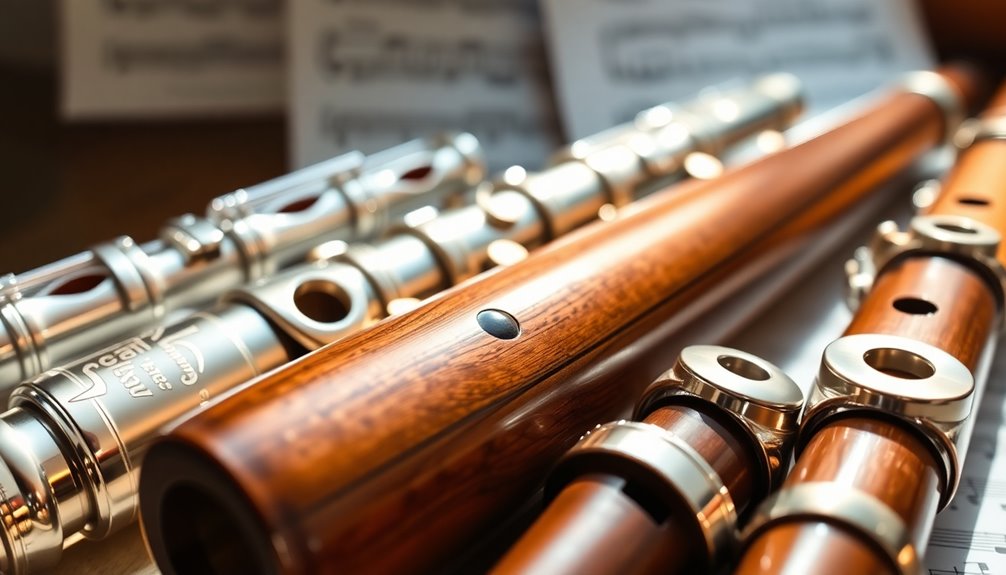
Specialty flutes encompass a diverse range of instruments designed for specific musical styles or performance contexts. If you're exploring unique tonal qualities or seeking versatile sound options, these flutes can greatly enhance your musical palette.
Native flutes, often crafted from wood or bamboo, embody a rich cultural heritage and are typically tuned to pentatonic scales. They're ideal for folk music and spiritual performances, allowing you to connect deeply with both the instrument and the tradition it represents.
Concert flutes, on the other hand, dominate classical music settings. Made from silver, gold, or platinum, these flutes provide a bright, clear sound that allows for intricate melodic lines. Their design promotes a wide dynamic range, making them suitable for both solo performances and orchestral settings.
Piccolo flutes offer a distinct, higher-pitched voice that can cut through a full ensemble. Often played in orchestras and military bands, they require precise breath control and technique. You'll find that mastering the piccolo can expand your technical prowess and enhance your overall musicianship.
Finally, alto flutes present a richer, darker tone than their concert counterparts, making them perfect for chamber music or contemporary compositions. Their lower range can create a beautiful contrast within ensemble settings. Additionally, the flute family includes concert, piccolo, and alto flutes, each contributing unique characteristics to various musical performances.
Frequently Asked Questions
How Do I Choose the Right Flute Material for My Skill Level?
Choosing the right flute material for your skill level involves considering your goals and budget.
As a beginner, you might lean towards student models made from silver-plated or nickel materials, which offer durability and affordability.
Material advantages vary—silver produces a warmer tone, while other alloys can be more forgiving.
Evaluating your commitment level will help you select a flute that not only suits your current needs but also supports your growth as a player.
Can I Mix Different Materials in a Single Flute?
Imagine crafting a musical masterpiece, where different materials harmonize like a well-tuned orchestra.
Yes, you can mix materials in a single flute through innovative flute construction techniques, resulting in what's known as hybrid flutes.
These flutes often combine the warmth of wood with the brilliance of metal, enhancing both sound quality and playability.
How Does Climate Affect Flute Performance?
Climate greatly affects your flute's performance. Humidity can cause the pads to swell, impacting their seal and creating issues with sound quality.
Temperature variations can lead to expansion and contraction of the materials, altering your flute's tuning and responsiveness. As you play, you might notice these changes, so adapting your technique and maintenance routine to the climate is essential for peak performance.
Understanding these factors will enhance your playing experience and connection with your instrument.
What Maintenance Is Required for Different Flute Materials?
Maintaining a flute is as essential as tuning a grand symphony.
For wood flutes, you'll need to focus on wood care, using oils to prevent cracking and guarantee longevity.
On the other hand, metal flutes require dedicated upkeep, including regular cleaning to avoid tarnishing and making sure pads remain in good condition.
Are There Significant Differences in Sound Production Between Materials?
Yes, there are significant differences in sound production between flute materials.
The material density affects sound quality, as denser materials tend to produce a warmer, richer tone while lighter materials may yield a brighter, more focused sound.
You'll notice variations in resonance and projection based on these characteristics.
As you explore different flutes, consider how each material influences your playing style and the overall sound you want to achieve in your performances.
Conclusion
In choosing a flute, you weigh the warm, rich tones of wooden flutes against the bright, clear sound of metal ones. While plastic flutes offer affordability and durability, composite flutes blend characteristics of both wood and metal, providing versatility. Specialty flutes introduce unique soundscapes, expanding your musical expression. Ultimately, your choice reflects not just preference but your artistic identity, highlighting the balance between tradition and innovation, warmth and clarity, accessibility and artistry in your musical journey.


